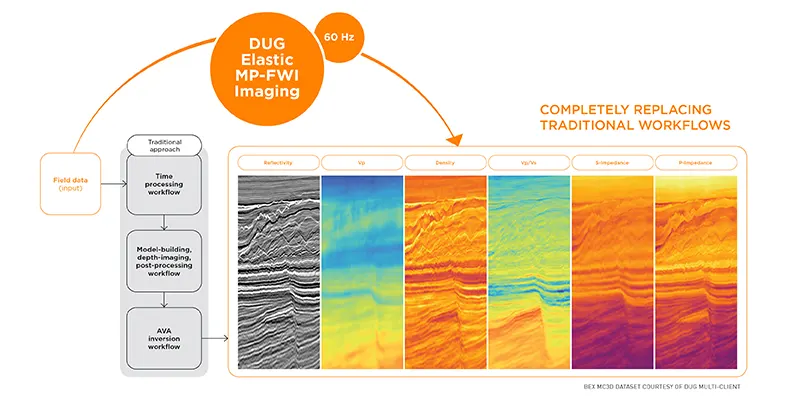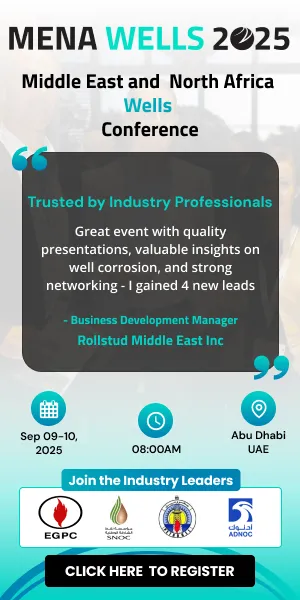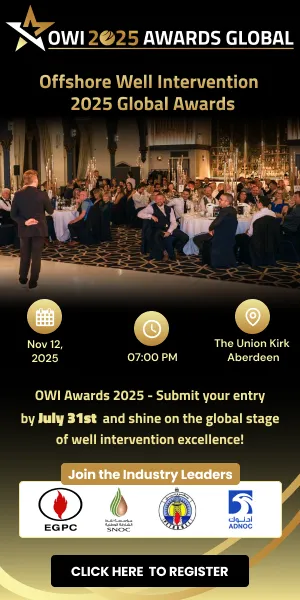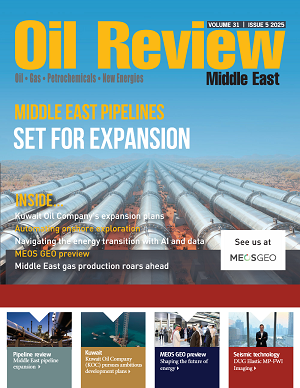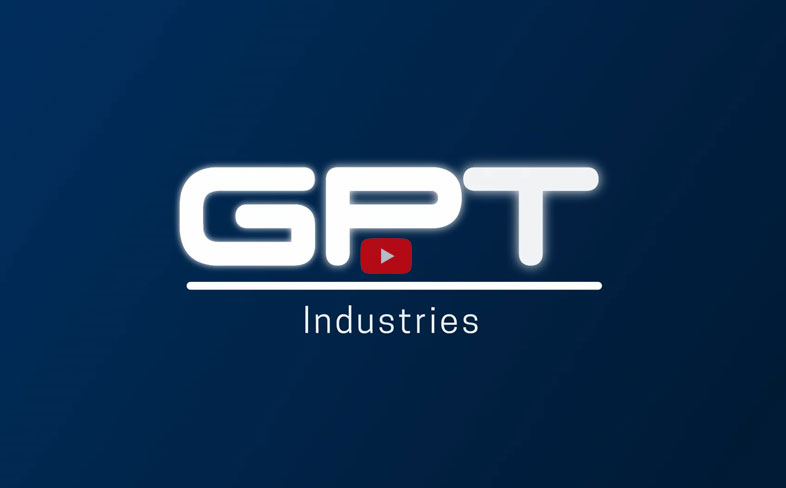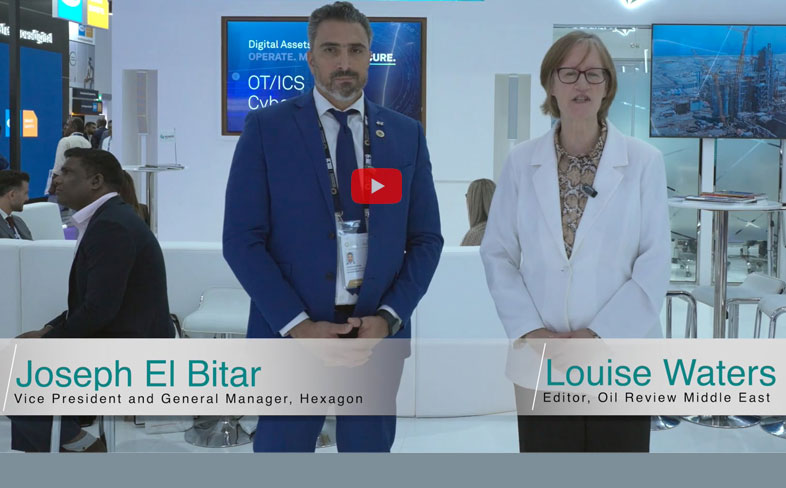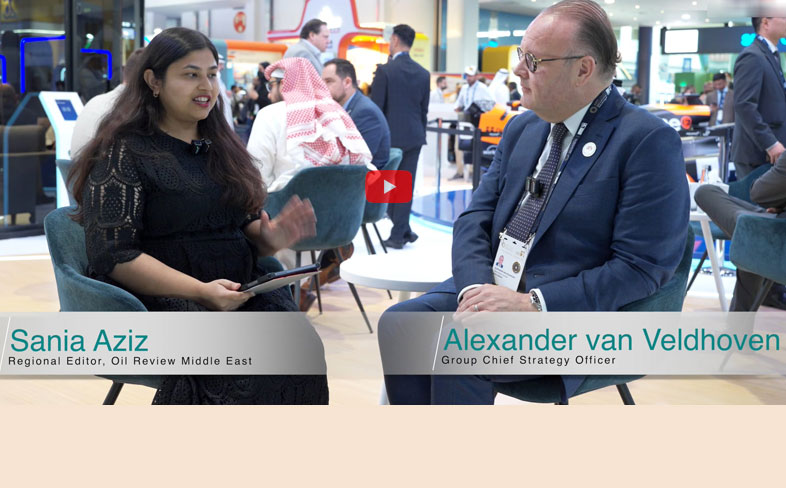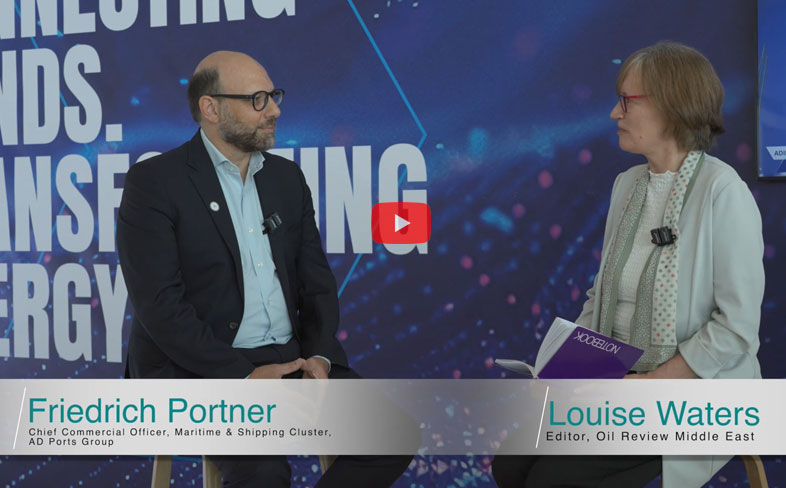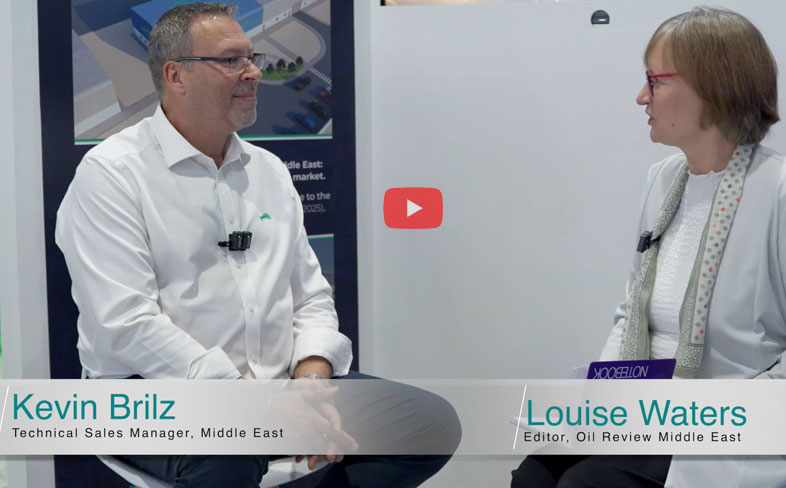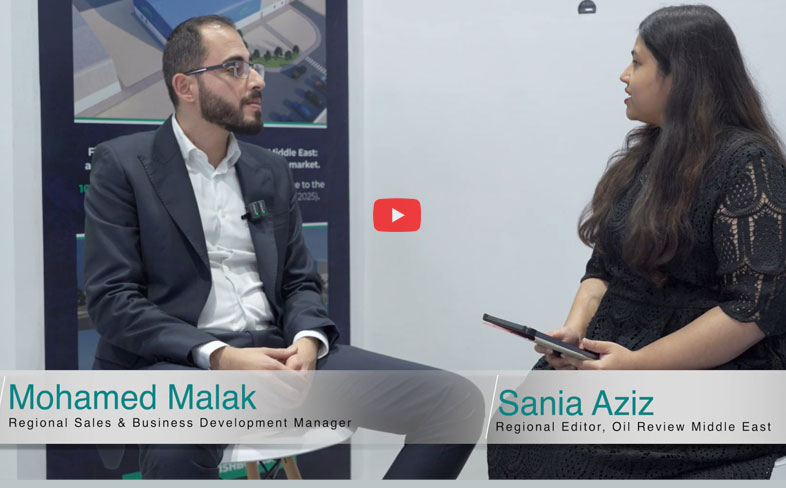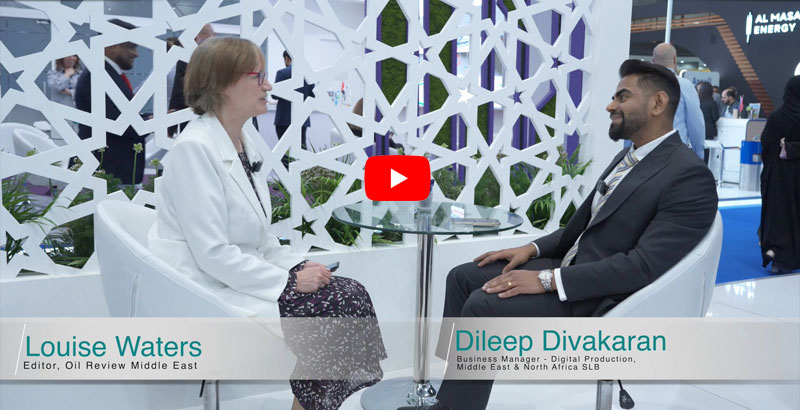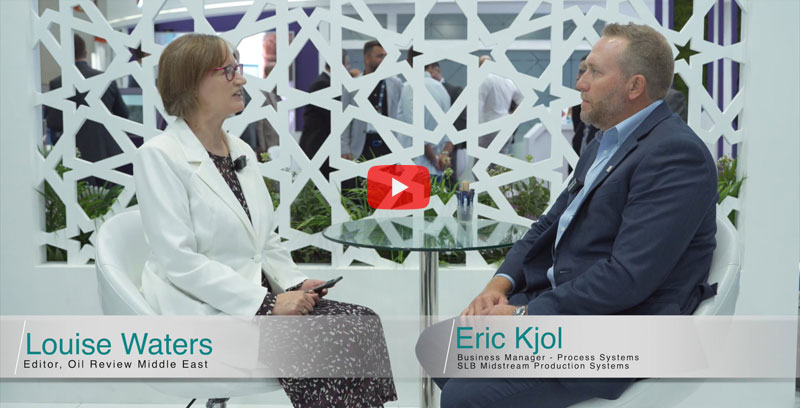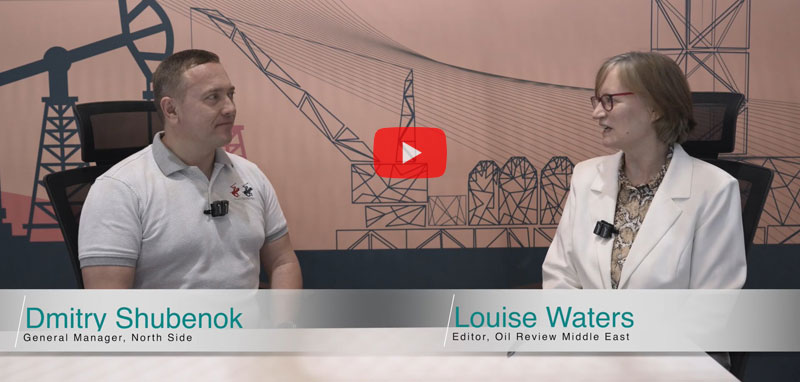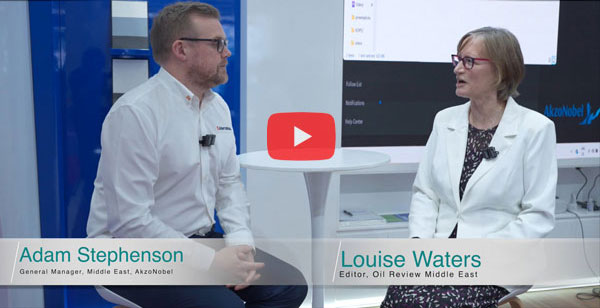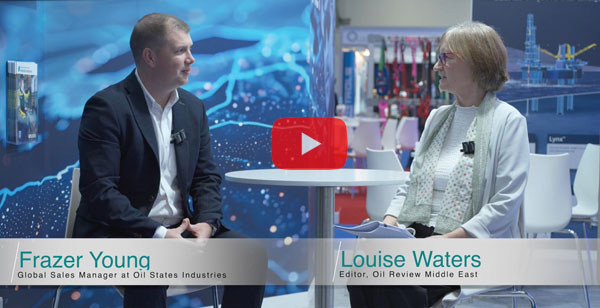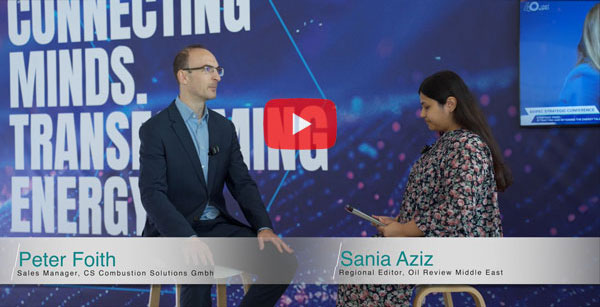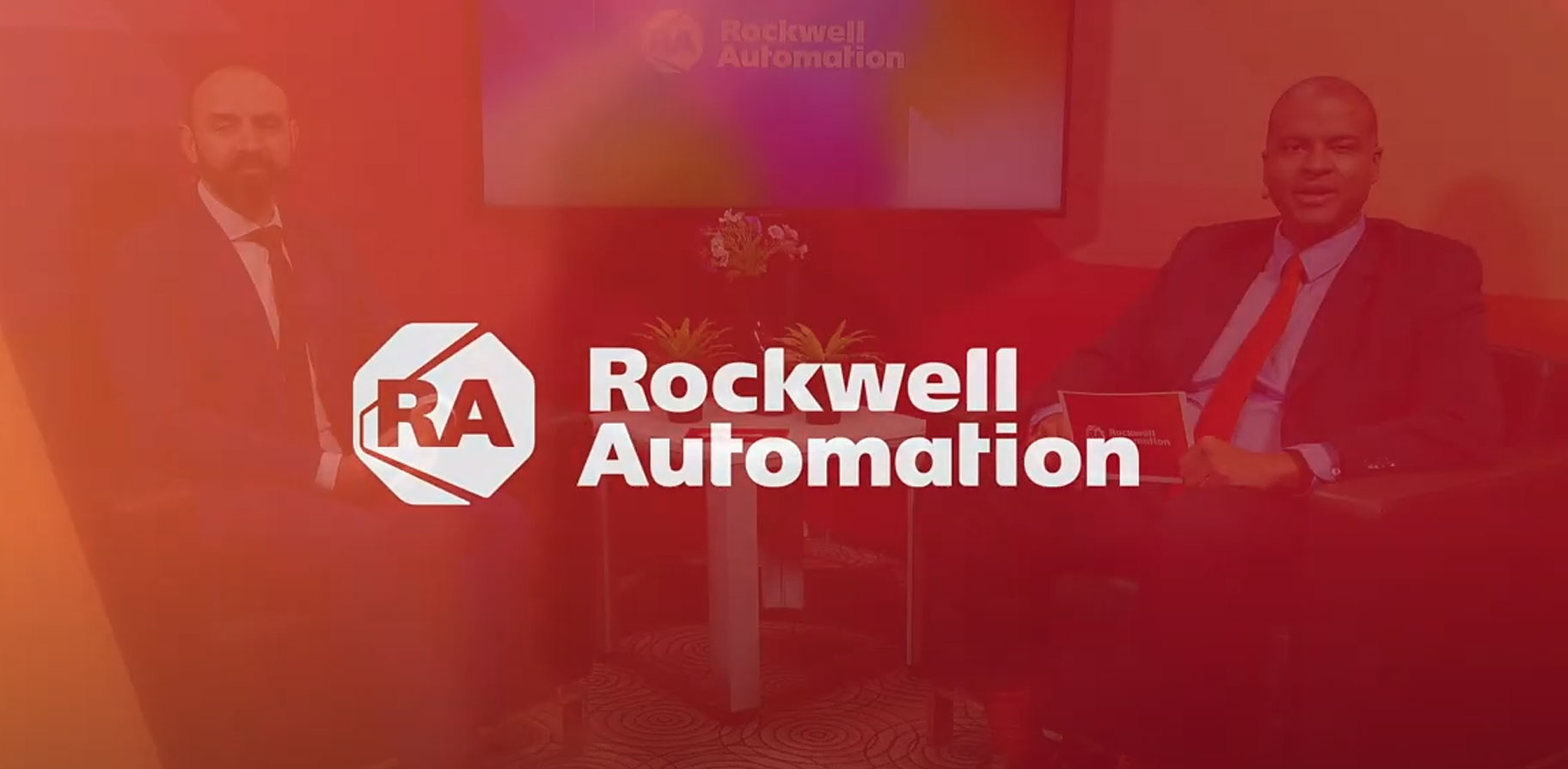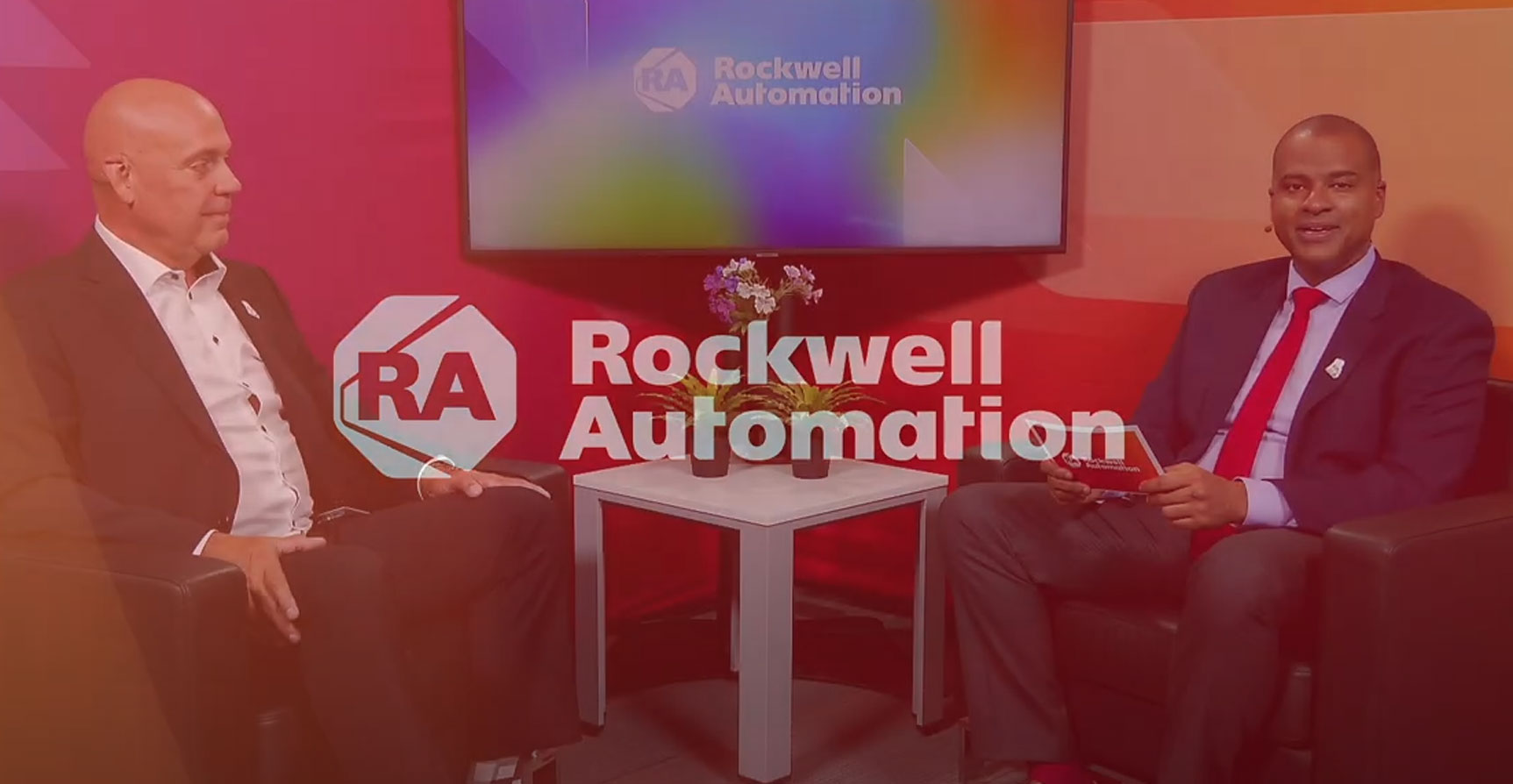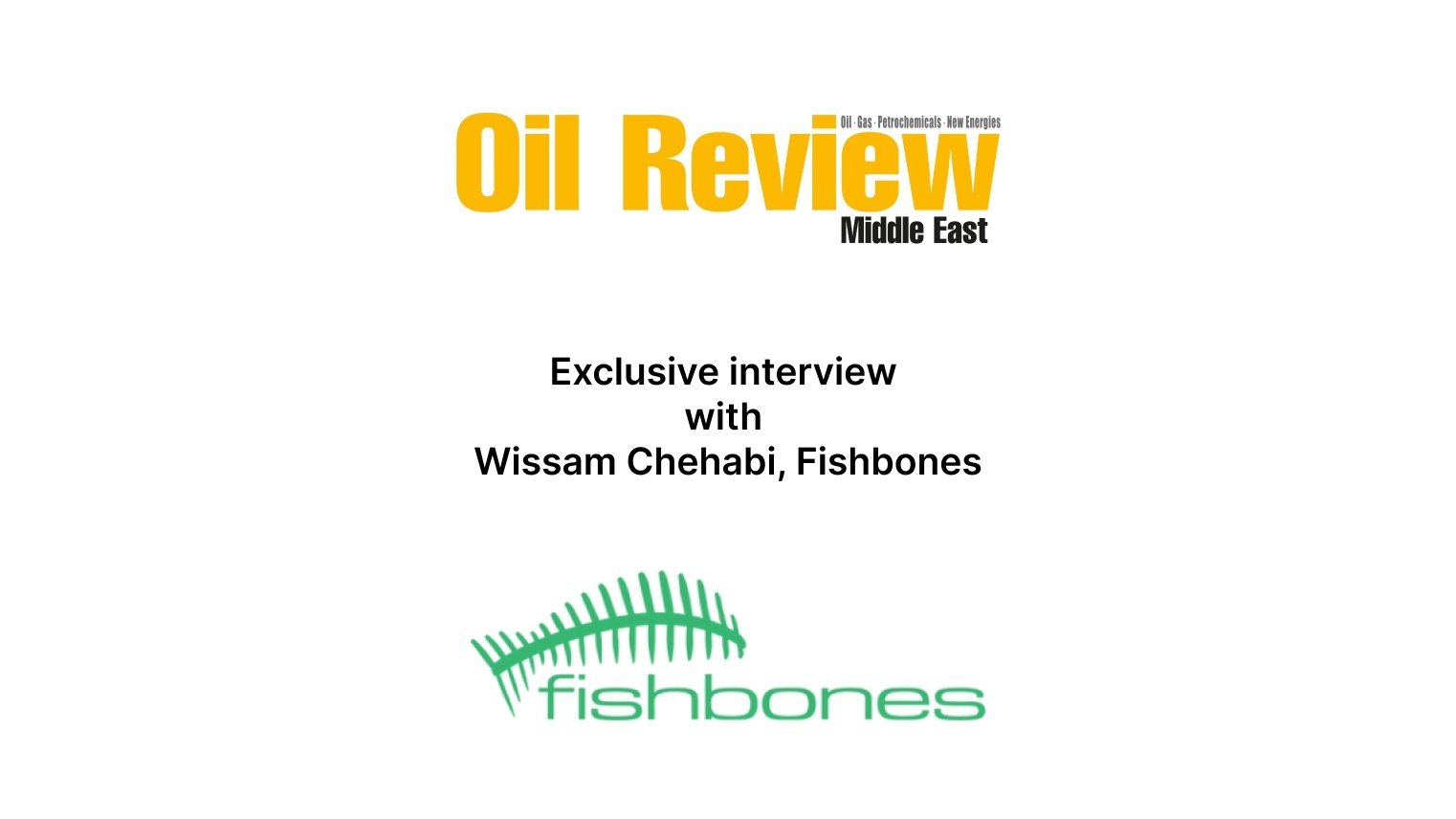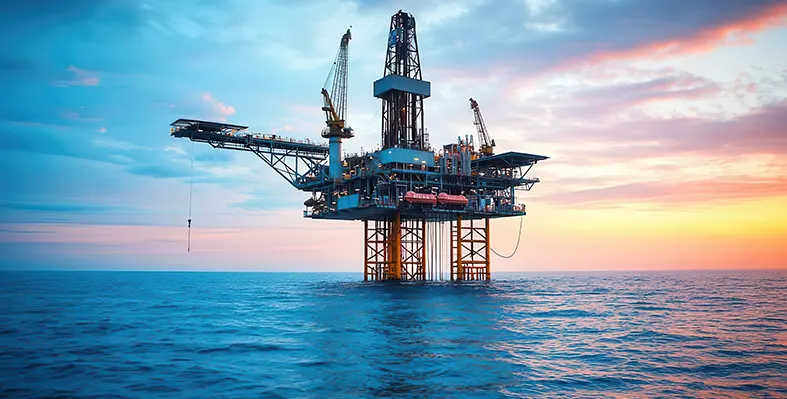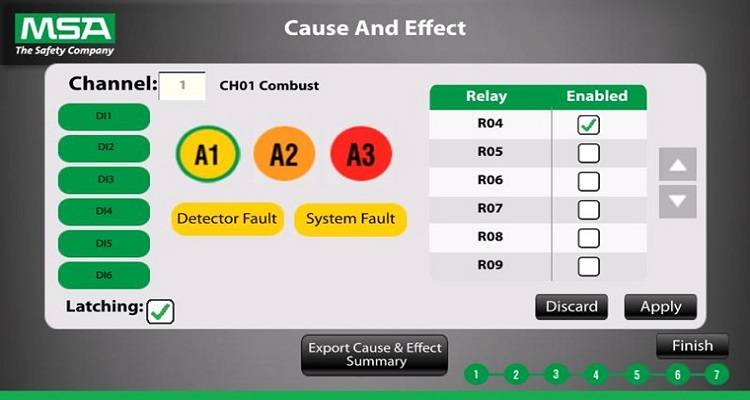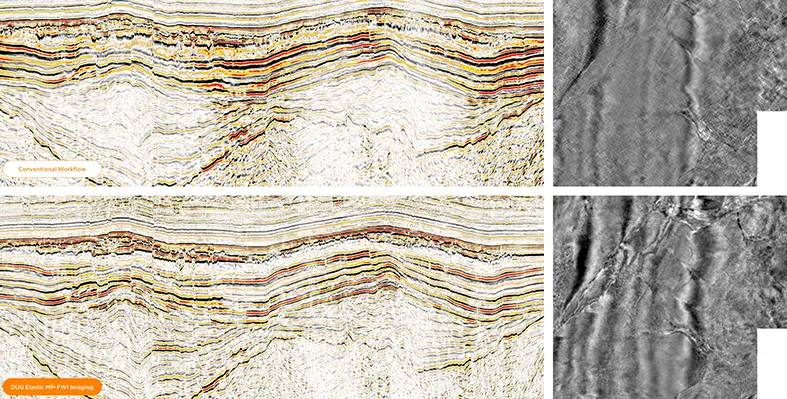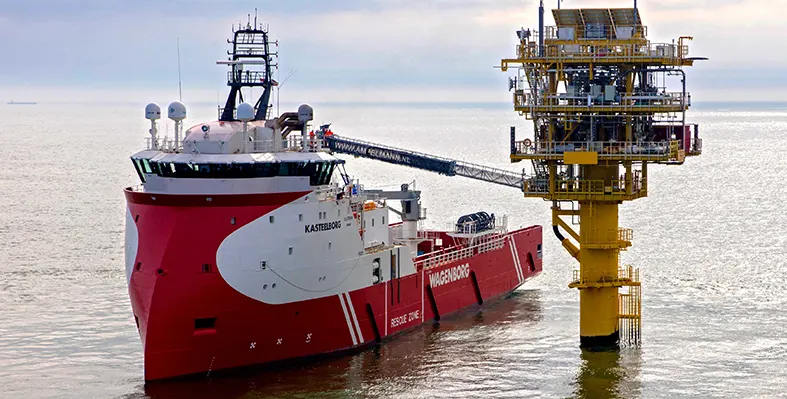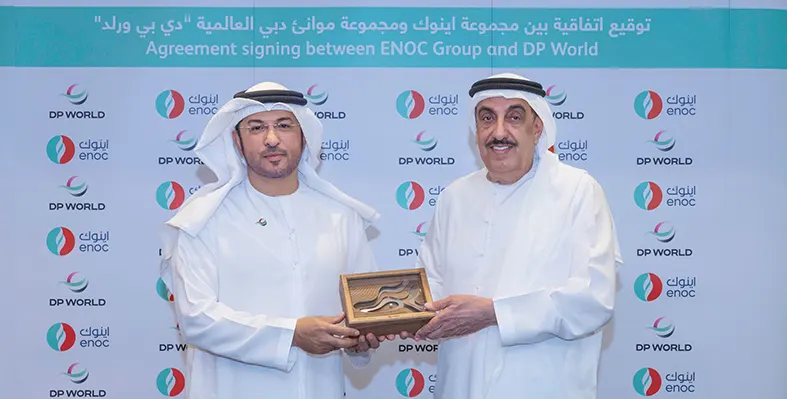In The Spotlight

The event will address the security challenges in the Middle East oil and gas sector, and how Pelco solutions can help.
Eyes on efficiency: how Pelco can transform oil and gas operations
Looking to supercharge your oil and gas security?
From desert facilities to offshore platforms, Middle East oil and gas sites require video security built to withstand extreme heat, corrosion and hazardous conditions.
Join Pelco for an exclusive online discussion on 16 September, 3pm GST to gain actionable insights into the industry’s top security challenges, and learn how Pelco’s ruggedised camera systems, designed for extreme environments, are rising to the challenge.
At the session, entitled “Eyes on efficiency: how Pelco can transform oil and gas operations,” discover how you can
• Protect assets in extreme and hazardous conditions
• Improve regulatory compliance and worker safety
• Minimise downtime, enhance operational efficiencies and reduce losses
• Future-proof and optimise security operations.
The expert panel will provide insights and real-world use cases demonstrating how the Pelco portfolio is transforming security ROI in oil and gas, from explosion-proof, long-range and AI-powered camera systems, legacy system integration and predictive safety alerts, to halo sensors for safety in zones where cameras can’t go.
Speakers are:
• Andy Shartzer, Technical Evangelist, Pelco
• Saqib Farooki, Middle East Oil & Gas Expert, Pelco
• Shamsheer Mohiuddin, Lead PMC Telecom Engineer, Kent PLC.
The session will be moderated by Louise Waters, Editor, Oil Review Middle East.
Don't miss this opportunity to gain actionable insights and position your operations for success. Book your place now and discover how Pelco can transform your approach to security.
OQ and SOMO agreements to boost Oman-Iraq energy co-operation
Energy ties between Oman and Iraq are set to strengthen with the signature of two MoUs between OQ, Oman’s global energy investment group, with Iraq’s State Oil Marketing Organization (SOMO), the federal oil marketing arm of the Iraqi Ministry of Oil
The first MoU establishes a long-term partnership to develop and operate an integrated crude oil storage project with state-of-the-art infrastructure for storage, loading and unloading at Ras Markaz in Duqm. It will have an initial capacity of 10 million barrels with the potential for expansion.
The second MoU enables OQ Trading to market Iraqi crude in international markets.
By developing modern storage facilities and expanding crude trading capabilities, the two countries aim to maximise value, stimulate cross-border investment, and reinforce their positions as vital hubs in global energy trade.
Eng. Salem bin Marhoon Al Hashmi, Managing Director of Oman Tank Terminal Company (OTTCO), highlighted that since commencing operations at Ras Markaz in 2023, OTTCO has handled more than 300 million barrels of crude oil. The terminal is strategically located outside the Strait of Hormuz, offering international companies large-scale and flexible storage solutions and positioning Oman at the forefront of global energy logistics.
OTTCO operates the products export terminal at Duqm Port, part of the Duqm Refinery (OQ8), and is advancing into clean energy infrastructure through global partnerships in ammonia and green hydrogen, in line with Oman Vision 2040 objectives and the shift toward low-carbon energy.
Wail bin Zuhair Al Jamali, chief executive officer of OQ Trading, said, “This collaboration opens a new platform to reshape the region’s oil trading landscape. At OQ Trading, our global network and deep expertise in complex trading operations enable us to forge innovative alliances that strengthen Oman’s role as a hub for trade and investment.”
The two agreements additionally pave the way for knowledge exchange between OQ and SOMO, foster bilateral investment, and create new jobs across both the public and private sectors.

Ibrahim Moussa, managing director of KSA and Bahrain at SLB and co-chair of MEOS GEO 2025. (Image source: SLB)
Looking ahead to MEOS GEO 2025
Ibrahim Moussa, managing director of KSA and Bahrain at SLB and co-chair of MEOS GEO 2025, speaks to Oil Review Middle East about his hopes for the upcoming MEOS GEO show in Bahrain, and business prospects for SLB in Saudi Arabia and Bahrain
MEOS GEO 2025, the Middle East's premier upstream oil, gas, and geosciences event returns to Exhibition World Bahrain from 16 – 18 September 2025. This long-established flagship platform unites energy leaders under the theme 'Energy for a prosperous future: Leading a sustainable tomorrow,' serving as a catalyst for advancement in the oil, gas and geosciences sectors by fostering collaboration, showcasing cutting-edge technologies, and promoting sustainable energy solutions in a rapidly transforming energy landscape. The event will bring together a diverse array of stakeholders, including national and international oil companies, technology pioneers, and service providers, to address the industry’s most pressing challenges and opportunities.
Moussa starts by expressing his excitement about the event and his role as conference co-chair alongside Alexander van Veldhoven, Chief Strategy Officer, Bapco Energies, under the leadership of Conference Chairman Sultan S. Al-Shamrani, Director Reservoir Management, Aramco and the executive committee.
“I believe this edition is poised to be truly remarkable. The theme, the level of participation, and the number of submitted abstracts are all outstanding. Platforms like MEOS GEO, with their rich heritage and history, play a vital role in uniting industry leaders and researchers. This collaborative effort is essential for tackling the critical challenges facing our industry today, particularly in the realms of energy and geoscience.”
Top of the list is the challenge of meeting the rising need for energy, while meeting sustainability and zero emissions targets. “The theme of 'Energy for a prosperous future: Leading a sustainable tomorrow' really resonates.”
Discussions around the energy transition and sustainable practices will therefore feature strongly.
“We want to advance the discussions around carbon capture and storage technologies, and integrating new energy sources. SLB and other companies will talk about some of the plays we have globally in geothermal and hydrogen and other new energies. There have been discussions on the regulatory framework that supports sustainability; that is going to be very important moving forward, as it will drive things in the right direction.
MEOS GEO 2025 takes place from 16-18 September in Bahrain.
“We need to balance economic viability and the environmental stewardship needed to reach sustainability objectives.”
One aspect that Moussa is particularly passionate about is engaging the youth. “These platforms show the youth and young professionals that the energy field is still a very viable, thriving, and innovative industry that continues to renew itself. This is an important element that we will explore and fully support. We aim to not only engage the youth but also drive community engagement and public support for the industry.”
Turning specifically to SLB’s focus at the show, Moussa says the company will showcase several solutions aimed at driving value and reducing costs, with a particular emphasis on digital transformation, production optimisation, and intervention technologies.
In this context he mentions SLB’s “game-changing” acquisition of Champion X, completed recently, which will see the integration of ChampionX production chemicals and its complementary artificial lift, digital, and emissions technologies, strengthening SLB’s position as a leader in the production and recovery space.
“It's a very complimentary portfolio, particularly in the space of production chemicals and artificial lift,” explains Moussa. “We have a lot to share with our esteemed clients in the Kingdoms of Saudi Arabia and Bahrain. For example, we will highlight aspects such as digital surveillance expansion, chemical injection, integrated facilities, and pipeline optimisation. In summary, these innovations will help our clients increase production efficiency, lower the cost of ownership, and continue their journey towards sustainability.”
Commenting on business prospects for SLB, he says, “We are very proud that we have more than 85 years’ history in the kingdoms of Saudi Arabia and Bahrain. We've been on a long journey, moving to manufacturing, localisation, and local talent development, to the point where most of our workforce is recruited locally. In the last two years, we managed to double the number of our female engineers and females in support functions in Saudi Arabia and Bahrain. So there is lots going on here. We stay very close to our clients to support their needs. We have completed high impact local projects supporting the region’s growth. There are opportunities in the key growth themes such as unconventional gas development, integrated work and digital workflows that bring a lot of efficiency gains, as well as the transition technologies and decarbonisation projects, which I touched on before. From the beginning we have had a very strong service delivery culture, and with the introduction of sustainable solutions we can complete that journey of efficiency and sustainability, bringing down the cost of total cost of ownership by passing on those efficiency gains.”
SLB’s technologies and solutions continue to evolve, he says. “We continue to focus on engineering and manufacturing equipment locally, and developing the local talent that will provide the service. Most importantly, we remain focused on responding to our clients’ needs and providing those solutions that they require from us. We remain fully committed to the culture of HSE and service quality.”
Concluding, Moussa reiterates, “To revisit some of those themes, digital innovation, production performance and enhancement, bringing down the cost of ownership, bringing about efficiency gains, sustainability, technical alignment, are the themes we will be focused on in this very exciting edition, along with exciting the youth. This is an industry that has a lot to offer, and has a bright future.”
MEOS GEO 2025 takes place from 16-18 September in Bahrain.
Cairo, Egypt
Dana Gas Egypt investment programme makes successful headway
Dana Gas has reported success in the initial stages of its US$100mn investment programme to increase Egypt’s gas production
The US$100mn investment programme, which involves the drilling of 11 new wells, is expected to significantly increase Dana Gas’s long-term production in Egypt and add approximately 80 bcf in recoverable gas reserves over the course of the two-year plan.
The company has received encouraging initial results from the ‘Begonia-2’ appraisal well, the first appraisal well within the Begonia development area in Egypt’s onshore Nile delta and the first of eleven appraisal and exploration wells planned under the investment programme. The well is estimated to contain nine billion cubic feet (bcf) of gas as an initial estimate, which is subject to increase. Begonia-2 will produce an additional five million cubic feet per day. The well is located in the "New El-Manzala" concession and is operated by the El-Wastani Petroleum Company (Wasco).
The company has also begun to re-complete several wells in other geological layers, which are expected to add more reserves and enhance production. Work is currently underway on the Balsam-3 well, where estimated reserves are 4 bcf, with an anticipated additional production of 3 million cubic feet of gas per day. The successful recompletion of Balsam-3 is expected to reduce the risk associated with drilling exploration wells in the area and further enhance output.
Richard Hall, CEO, Dana Gas, said, “We have been developing and producing gas in Egypt for over a decade, and the signing of the concession area consolidation agreement with the Egyptian Natural Gas Holding Company (EGAS) late last year has allowed us to acquire additional areas under improved financial terms, enabling us to launch this new phase.
“The success of drilling this well opens vast prospects for gas production in the 'Begonia' area and presents promising future opportunities for expansion and growth. It will also extend the operational life of our assets in Egypt. We are fully committed to making every effort to ensure the success of the programme and its efficient and timely execution. Dana Gas reaffirms its strong commitment to reinvesting the payments it receives from the Egyptian government into executing this ambitious programme and supporting future development projects in the country.”
IFS event to underline Saudi Arabia industrial AI potential
IFS, a leading provider of enterprise cloud and Industrial AI software, is holding IFS Connect Middle East & Africa 2025, its customer and partner event in Saudi Arabia this year, underlining the scope for industrial AI solutions to contribute to the Kingdom's Vision 2030 strategy
With the theme “Powering Vision 2030: Industry-Centric Innovation for National Transformation”, the event, taking place on 10 September at Four Seasons Hotel Riyadh, will showcase how IFS’s industrial solutions & Industrial AI are enabling organisations in the region achieve tangible business outcomes and accelerate their contribution to national visions.
IFS Connect MEA will spotlight the company’s Industrial AI strategy and platforms, including IFS.ai, Nexus Black, and the recent acquisitions of TheLoops and 7bridges - designed to deliver predictive intelligence, closed-loop automation, and real-time decision-making for asset- and service-centric industries.
Rahul Misra, SVP & managing director, MEA at IFS said, “Saudi Arabia is a priority market for IFS, representing a rare convergence of scale, ambition, and urgency, a combination that perfectly aligns with IFS’s strengths in enterprise software and industrial AI. From giga projects to local upskilling, IFS Connect MEA will highlight how IFS technologies directly contribute to Saudi Arabia’s Vision 2030 and wider regional transformation.”
IFS, which opened its regional headquarters in Riyadh in Q2 2024, also announced the appointment of Mohammed Sa’adeh as country sales leader in Saudi Arabia.
Mark Moffat, CEO of IFS, will deliver the keynote session, outlining the company’s strategic commitment to the Middle East through sustained investment, talent development, and partnerships.
The exhibition hall will feature industry co-innovations, solution accelerators, and live demos, alongside five breakout sessions tackling sector-specific opportunities in Manufacturing, Energy, Utilities & Resources (EUR), Telecommunications, Service Industries and Aerospace & Defence (A&D).
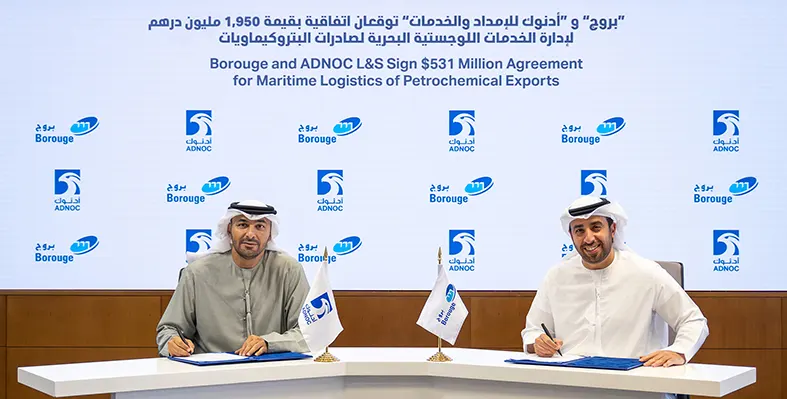
ADNOC L&S will manage the transportation of up to 70% of Borouge's annual production. (Image source: ADNOC L&S)
Borouge partners with ADNOC L&S to boost petrochemicals exports
Borouge Plc and ADNOC Logistics & Services Plc have partnered to boost the production and export of petrochemicals from the UAE, as Borouge prepares to ramp up production capacity
Borouge plans to increase production capacity by 1.4 million tonnes per annum by the end of 2026 through its Borouge 4 mega project, which will make it the world’s largest single-site polyolefin complex. The 15-year US$531mn service agreement, which will drive cost savings and efficiencies as well as enhancing Borouge’s supply chain network, covers port management, container handling, and feeder container ship services for the Borouge Container Terminal in Al Ruwais Industrial City, Abu Dhabi. ADNOC L&S will manage the transportation of up to 70% of Borouge’s annual production, deploying a minimum of two dedicated container feeder ships to transport Borouge’s products from Al Ruwais to the deepwater ports of Jebel Ali in Dubai and Khalifa Port in Abu Dhabi.
Hazeem Sultan Al Suwaidi, CEO of Borouge, commented, “This agreement builds on our longstanding collaboration with ADNOC L&S, a partnership that has been instrumental in meeting the evolving needs of our customers in high-growth markets. It brings significant benefits to Borouge; driving substantial operational cost savings and enhancing our Logistics Variable Cost (LVC), as well as complementing our existing rail operations and expanding the flexibility of our supply chain network. With the rapid increase in our production capacity, we are advancing our capabilities in delivering differentiated products and solutions efficiently, while keeping pace with rising global demand."
Captain Abdulkareem Al Masabi, CEO of ADNOC L&S, added, “This comprehensive container terminal agreement marks a major milestone in our successful partnership with Borouge, delivering on ADNOC L&S’ strategy to provide seamless, end-to-end logistics solutions that power the UAE’s industrial growth and export ambitions. By leveraging our extensive maritime and logistics expertise, we are ensuring that Borouge’s world-class petrochemical products reach global markets efficiently and competitively.”
Achieving tangible business outcomes with Industrial AI
Hannes Liebe, regional president, APJMEA at IFS, discusses Middle East business prospects and the evolution of industrial AI in advance of IFS Connect Middle East & Africa 2025, the company’s flagship customer and partner event
IFS, a global leader in industrial AI, sees strong prospects for growing its business in the Middle East, as Liebe explains.
“The Middle East right now is at a crossroads, following years of growth. Through AI, I believe we’re entering into a new era – the next industrial revolution. In the context of oil and gas, while the long term forecast for oil is generally downwards, at the same time natural gas and LNG are growing, along with new energies such as renewables and hydrogen.
“So the Middle East, with its appetite and ambition to lead the world in this new industrial era, plus the backdrop of what we see in oil and gas, makes this a very interesting opportunity for a solution provider like IFS, with our domain expertise and a similar level of ambition to lead our customers and industry into the future.”
He notes IFS’s focus on six asset-heavy industrial sectors – energy, utilities and resources; manufacturing; construction and engineering; aerospace and defence; services industries and telecommunications – and has always focused on execution.
“In asset-heavy industries, the software has to do the job. It’s not technology for technology’s sake. That is particularly the case in oil and gas, given the price constraints. It’s about uptime. It’s about the lifespan and serviceability of the assets. So it is a very important topic, and we have market-leading solutions to help customers optimise across their asset lifecycle.”
“It’s similar for the growing gas and LNG sector. Where do you invest the capital? How do you do the capital planning around this? How do you do maintenance for these assets? Predictive maintenance will become the rule, so you need a software platform that does this.”
Turning to the third area of new energies and hydrogen, he stresses that sustainability needs to be looked at from a business rather than a CSR perspective; there has to be a tangible ROI.
“If I invest in these emerging areas, how will they deliver the ROI that I need?
“All this is software related. It’s a big opportunity for IFS, and that’s why we are investing heavily in the Middle East.”
Approach to industrial AI
Discussing the company’s approach to industrial AI, he says “Industrial AI means contextual AI. This is all about AI in business context. We start from the business problem and the business process, and then look at the technological remit to resolve it. AI provides new capabilities that we didn’t have before. It is not about technological gimmicks, but to support the execution, to get the job done. In that way, it’s not about technology, it’s about business process.” It is this approach that has primed companies such as IFS to be very successful in this space where others have fallen, with a recent MIT study finding that 95% of generative AI pilots at companies are failing.
Discussing the challenges to AI adoption, Liebe highlights legacy systems and fragmented data, and the issue of trust. “If I were in oil and gas, I would be sceptical if it were just about the tools, the next tech. Can I really trust what that tool delivers to me? In an industrial context, if your prediction is wrong, it could have catastrophic consequences. The trust element only comes if it is executions and operations related; it cannot be just a tech tool. As with any technological innovation, the legacy will always drive us, but there’s also a mindset issue; the softer part of technological adoption will play a role. And I think we all have a journey to walk, on the supplier side as well as the customer side. We are in this together.
“What makes the difference in AI? The best way to summarise this is ‘dreams and details’. It needs ambition in the dream, and the rigorous focus on details to create the trust.”
Liebe highlights the company’s initiative with Nexus Black, whereby a world-class team of AI engineers are working with the customer to create AI-based solutions that solve real-world problems, in a scalable, reliable and trustworthy way.
A recent report from IFS highlighted that the evolution of industrial AI is creating a shift in business models, changing how businesses are run, automating maintenance, predicting disruptions, optimising supply chains, and facilitating intelligent decision-making across field service, asset management, and manufacturing. Elaborating on this, he comments, “Many companies are shifting their model to outcome-based revenue streams, meaning that predictive maintenance will become the rule. AI will fuel this, so we will see business model transformations and new revenue streams being enabled through the power of AI.”
Giving a specific example from the oil and gas sector, he highlights the company’s partnership with TotalEnergies, which will see all the energy company’s assets, from exploration and production to refineries and chemicals, moved into one platform through IFS Cloud, for streamlined asset management and servicing. When fully implemented, more than 13,500 users globally will be enabled to perform asset maintenance.
“It’s only by bringing all these assets together that you can truly optimise and make full use of AI,” he explains. “You can automate and create scale. This is an example of where IFS can truly help.”
IFS Connect Middle East & Africa
Turning to the IFS Connect event in Riyadh and how IFS will support the Saudi Vision 2030 strategy, he comments, “At its core, Saudi Vision 2030 is an example of ambition, urgency and sustainability. That is fully in line with how we think. We have that sense of urgency, but we want to show a commitment as well by building local talent, local partnerships, local presence. So we have moved our regional headquarters to Riyadh, and are partnering with local companies to strengthen our presence and enhance our capabilities. Moving our regional event for the Middle East and Africa to Riyadh is also testimony to this. The ambition in Saudi is palpable, and we want to be a part of it.”
With the theme “Powering Vision 2030: Industry-Centric Innovation for National Transformation”, IFS Connect will showcase how IFS’s industrial solutions & Industrial AI are enabling organisations in the region achieve tangible business outcomes and accelerate their contribution to national visions.
It will provide a valuable opportunity to share real stories with real customers, Liebe says, highlighting the company’s customer focus. It will also provide actionable value in the industrial context, with breakout sessions for each of its industrial verticals, where customers can share their experiences with their peers.
“Thirdly, it’s about inspiration, coming back to the dreams and details,” he concludes. “We all have to dream together, no-one has it all. And there is no better way of doing this than in an industry event context.”
Webinar: Transforming oil and gas operations with the Elios 3 drone
Despite advances in digital technology, many oil and gas sites across the Middle East still rely on manual entry for tank and vessel inspections, resulting in days of downtime, high scaffolding costs and risk to human life
What if you could change all that with drone technology?
Inspections drones such as the Elios 3 are revolutionising the world of confined space inspections, improving safety, reducing downtime and enhancing operational efficiency.
Join us for an exclusive live webinar hosted by Flyability in association with Oil Review Middle East on ‘Transforming oil and gas operations with the Elios 3 drone’ on Tuesday 2 September at 2pm GST. Industrial experts will explain how drones such as the Elios 3 are transforming confined space inspections, and how you can integrate this technology into your operations seamlessly.
Key highlights:
Drone integration: learn how to safety and effectively implement drones in confined space
Safety and training: understand essential safety protocols and training strategies for your team
ROI: discover how to measure and achieve a strong return on investment with drone technology
Real world use cases: hear from the engineers using drone tech in the field on the impact Elios 3 is having on in oil and gas inspections.
Speakers and host:
Fabio Fata – senior sales manager, Flyability (moderator)
Eralp Koltuk – inspection lead engineer, Tüpraş
Danijel Jovanovic – director of operations, ZainTECH
Take your operations to the next level! Don’t miss out on gaining valuable insights into how drones can make inspections safer, faster and smarter .
From making inspections in hazardous confined spaces much safer to streamlining the whole process and providing valuable real-time data, you will get to see exactly how the Elios 3 is changing the game.
Mitsubishi Power completes Egypt hydrogen fuel conversion project
Mitsubishi Power has completed a groundbreaking hydrogen fuel conversion project at the Alexandria National Refining and Petrochemicals Company (ANRPC) refinery in Egypt, the first industrial application of hydrogen use as fuel in an industrial boiler in Egypt and the MENA region, according to the company
Mitsubishi Power carried out the design, engineering, supply and installation of the equipment and control systems to rehabilitate and upgrade a 100-ton-per-hour main boiler, converting it from heavy fuel oil and natural gas to a 100% hydrogen fuel. The project also contributed to the utilisation of 14,000 tons per year of hydrogen-rich gases available in the production units, reducing natural gas consumption by around 24,000 tons and contributing to a reduction of carbon emissions by approximately 65,000 tons per year.
This project marks a significant step forward in Egypt's energy transition and decarbonisation goals, as well as its aim to become a leader in the global hydrogen economy, while highlighting the potential of hydrogen as a clean energy source in Egypt’s industrial sector.
Mitsubishi Power's expertise in providing cutting-edge hydrogen technology solutions, combined with ANRPC's operational leadership, contributed to the project's success, in a model that it is hoped can be replicated to drive forward further hydrogen adoption across Egypt and the MENA region.
Sayed Al-Rawi, chairman and managing director of ANRPC, said, "We are proud to be part of Egypt's journey towards a clean energy future and to contribute to achieving Egypt Vision 2030 with this pioneering milestone to using hydrogen as a fuel. This project represents an unprecedented achievement for ANRPC, Egypt, and the entire region. By integrating hydrogen into refining processes, we are contributing to reduce Egypt's carbon footprint and set a new standard for the country's industrial sector.”
Javier Cavada, president and CEO, Europe, Middle East and Africa at Mitsubishi Power, added, "The success of this first-of-a-kind hydrogen conversion project marks a milestone in Egypt's transition to clean energy and reflects Mitsubishi Power's global leadership in developing advanced, low-carbon power generation technologies. This project will lay down the foundation to a commercial path for decarbonizing Egypt's industrial facilities with minimal downtime, in addition to demonstrating the tangible and positive impact of hydrogen in reducing emissions and developing sustainable energy solutions."










